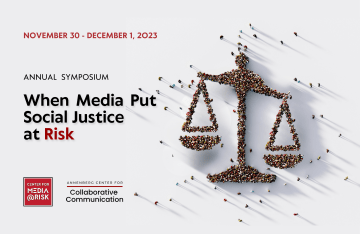
Center for Media at Risk and Annenberg C3 Symposium: When Media Put Social Justice at Risk
- Annenberg School for Communication
Join the Center for Media at Risk and the Annenberg Center for Collaborative Communication for a symposium examining what happens when media practices, values, infrastructures, or ownership pose risks to social justice.
Media platforms are often optimistically positioned as relatively generative opportunities for social justice campaigns because of lower barriers of entry and heightened visibility. But these opportunities are also often shaped by opposition, contradiction and even violence, resulting in inequitable political-economic and legal infrastructures, misogynistic and racialized media practices and dangerous polarizations. This symposium addresses the contradictory ways in which media platforms can result in intentional or accidental thwarting of social justice, as well as the ways in which media platforms can assist and extend social justice efforts.
Register Here!
Symposium Schedule
Thursday, November 30
5:00-5:30pm | Light Reception
5:30- 5:45pm | Welcome and Introductory Remarks
5:45-7:15pm | Keynote Address
7:15-8:30pm | Reception
Friday, December 1
9:30-10:00am | Breakfast
10:00-10:15am | Introduction
10:15-11:45 | Panel One: Context
Media are created, experienced and understood within a broad social, cultural, political, and economic context. What are some of the contextual factors of the media that can put social justice at risk? What are some of the contextual factors of the media that might allow for expanding and enhancing social justice efforts?
11:45am-1:00pm | Lunch
1:00-2:30pm | Panel Two: Conditions
Media platforms are often shaped by the political-economic and legal conditions that support them. How do these conditions exacerbate or intensify the media’s capacity to put social justice at risk? Are there alternative conditions that might enhance the media’s efforts toward social justice?
2:30-2:45pm | Refreshments
2:45- 4:15pm | Panel Three: Consequences
What are the consequences of putting social justice at risk and how might the media position themselves more productively to embolden social justice initiatives? Are these consequences mainly focused on the individual user’s level, or can we imagine broader and more liberatory structural consequences?
- André Brock
- Yoel Roth
- Francesca Tripodi
- Moderator: Valentina Proust
4:15-4:45pm | Closing Remarks
4:45-6:00pm | Reception
About the Center for Media at Risk
The Center is devoted to fostering free and critical media practice and scholarship. Political intimidation threatens media practitioners worldwide, while disinformation campaigns destabilize public trust in an unprecedented fashion. The Center provides a global hub for practical and scholarly strategizing in response to the threatening political conditions that undermine the global media environment. Understanding how media practitioners work under occupational risk—from explicit authoritarian regimes and circumstances of creeping authoritarianism to racial violence, misogyny, classism, settler colonialism and homophobia—rests at the core of the university’s mission. The Center for Media at Risk provides the educational tools necessary to identify evolving intimidation of the media worldwide.
About the Annenberg Center for Collaborative Communication
The Annenberg Center for Collaborative Communication (Annenberg C3) enables scholars to think and work across institutional, geographic and disciplinary divides. Jointly established by the USC Annenberg School for Communication and Journalism and the University of Pennsylvania’s Annenberg School for Communication, the center’s faculty, postdoctoral fellows and doctoral students seek to address emerging global issues broadly across the field of communication and media.
The first-of-its-kind center not only explores what “collaboration” means for the field of communication and media, but also provides critical infrastructure for reimagining and potentially revolutionizing how collaborative communication can be used to address complex issues such as health care, data privacy, cultural and demographic change, politics, new media, gender/racial equity and justice, media literacy and policy, journalistic trust, and the restructuring of media industries in an evolving age of streaming and networked distribution.
Events
View AllDisclaimer: This event may be photographed and/or video recorded for archival, educational, and related promotional purposes. We also may share these video recordings through Annenberg's website or related platforms. Certain events may also be livestreamed. By attending or participating in this event, you are giving your consent to be photographed and/or video recorded and you are waiving any and all claims regarding the use of your image by the Annenberg School for Communication. The Annenberg School for Communication, at its discretion, may provide a copy of the photos/footage upon written request.
